The 12th edition of EuroDIG, the pan-European Internet governance event, is taking place from 10-12 June 2020 online. You can expect sessions on technical and operational issues, security, justice, public empowerment, lessons learned from the COVID-19 pandemic and more. RIPE NCC staff at the event will be live-blogging key moments. Come back to this page for regular updates on the issues, arguments and ideas discussed over the course of the meeting.
12 June 2020, 19:00 CEST
Day 2: EuroDIG in a Rapidly Changing World
As it wrapped up three days of online discussions, EuroDIG 2020 concluded with a keynote presentation that served as an important reminder of the global Internet governance ecosystem and the developments happening there.
Special Adviser to the Secretary-General Fabrizio Hochschild echoed many of the sentiments that had been prominent in EuroDIG discussions. He noted that the “unusual and uncertain circumstances” of the COVID-19 crisis highlighted the need to manage digital technologies and raised the stakes of Internet governance. A challenge unique to our times is that health officials now have to not only treat patients, but also combat dangerous misinformation and cybercrime.
Less than twenty-four hours ago the United Nations Secretary-General released the report “Road map for digital cooperation: implementation of the recommendations of the High-level Panel on Digital Cooperation”. In it, he reiterates his support of a multistakeholder approach to digital cooperation. In a follow up to the Secretary General's call for a ceasefire, Mr. Hochschild stressed that this truce should apply to the digital world. Global cooperation is necessary to overcome the misinformation pandemic without compromising values like privacy and freedom of speech.
There will be much more written and discussed in the coming weeks and months in relation to the Secretary-General’s report and what precisely the outcomes of it will be (starting with next week’s Internet Governance Forum Open Consultation and MAG meetings). It’s clear that there is momentum for real change to the current structures and processes - Mr Hochschild, quoting last year’s Report of the UN Secretary-General’s High-level Panel on Digital Cooperation, noted that there was “a great deal of dissatisfaction with existing digital cooperation arrangements: a desire for more tangible outcomes, more active participation by governments and the private sector, more inclusive processes and better follow-up.”
Mr Hochschild’s call for a dynamic and responsive Internet governance approach, mirroring the ICT devices we continually upgrade, may have fallen a little flat following a plenary session that discussed the environmental impact of such built-in obsolescence. But the broader point about this sector’s rapidly evolving challenges is fundamental to the ongoing discussion of Internet governance structures and processes.
As we part ways for now, thank you for reading and don't forget to go over the final statements of EuroDIG 2020 and see if you have any feedback. Here they are, slightly paraphrased (so do check the real ones when they get published):
- We should increase efforts on digital literacy especially for the youngest and oldest among us
- We should create a long-term vision of the digital future and the impact of technology on life
- We should find antidote of fake news, increase journalism funding and defend freedom of expression
- The EU should increase investment for telecommunications infrastructure and raise their voice at international fora
- We should work on trust, both in regards to product and communication around it, as a prerequisite for innovation.
There you have it folks! Hopefully see you in Trieste next year for EuroDIG 2021! Stay safe!
12 June 2020, 17:00 CEST
Day 2: A Green Internet and the Right to Repair
Led by the two enthusiastic moderators, Michael Oghia and Alex Lutz, the five speakers together with the audience produced a lively discussion during this session about how to make the Internet greener. Unfortunately many questions could not be answered in the end. But this is definitely a discussion that will continue. Who knows, maybe also in the RIPE community.
Ilias Iakovidis from the European Commission (DG-Connect) suggested to create a “product passport” that would include all kinds of information about a product from the raw materials used all the way to how to destroy and recycle it. E-waste is the fastest growing waste and it is one of the European Commission’s goals to make the ICT sector circular and data centers climate neutral.
Olivier Vergeynst from GreenIT Belgium added that the biggest source of impact on the environment comes from consumer equipment, only because of the huge numbers of these devices. Only buying fewer devices can help!
Just like we use second-hand cars we need to use refurbished second-hand digital devices
Emma Fryer from Tech UK talked about data centers and the challenge to address the huge demand on data centers without destroying the globe.
Chris Adams from ClimateAction.tech said that it needs to be trivial to trust that our infrastructure works on green energy (just like we trust the DNS or HTTPS). In the energy sector there are also certificates issued. Why can we not combine these two sectors? He also said that it is a mistake to shift the responsibility to end users. We need to use proper procurement: we should not buy from any vendor who produces fossil-based products! This should be similar to accessibility requirements and it should be non-negotiable.
Beat Estermann from the university in Bern in Switzerland did a lot of research in this area and said that digitisation has had a negative net effect on the environment due to the rebound effect. A reversal of this trend requires concerted actions! We need international collaboration. National efforts and Internet governance efforts have been insufficient!
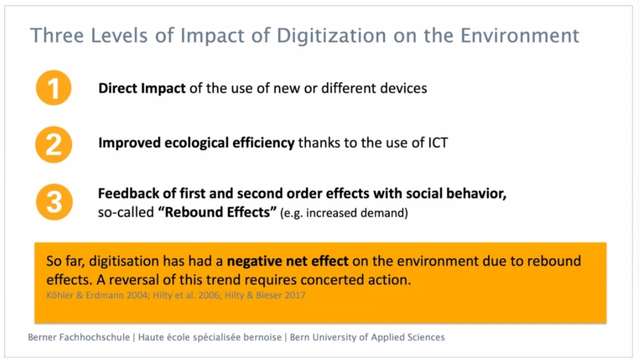
Lea Elsemüller, a youth representative of “Green Baden-Würtemberg” in Germany, promoted more local engagement but also inter-disciplinary collaboration. She said that every student and researcher needs to know what they are developing, also in terms of energy consumption. If you write code, you also try to use a little resources as possible.
A question from the audience started an interesting question about data centers and if it might help to put them all in the north of Europe? And indeed, there is a rapid growth in new data centers in Sweden Finland, Norway, Iceland. Both, power and cooling costs are lower there. However, not all data center models are suitable for that. And another problem is that there are of course existing data centers. They’re not all going to move. And new dat centers are build built next to existing ones.
Chris added that decentralisation is important, so having all data centers in one place is not desirable. We already have a much less diverse Internet eco system due to consolidation. And this is not a healthy eco system. The fewer large companies there are, the more influence they can get on regulations and policies (through their lobbying power).
Another question was related to the expected costs of 5G technology. The speakers agreed that 5G is actually the most energy-efficient technology we have at the moment. However, because we will have more antennas and more base stations, there will be more material needed. And let’s not forget the exponential growth of our online activities which has to be also calculated in.
About one topic the speakers were especially passionate about: the obsession with growth. We have to learn the concept of “sufficiency”. Consumers actually do care about their carbon footprint. It turns out that many consumers would be happy to keep a phone or device as long as the apps would still work! At the moment there is a built-in obsolescence: you have to buy a new device just because software isn’t updated on the old one. We need a right to repair and we need legislation for it, as pointed out by some of the speakers. In addition to that we need a new business model that gives the consumer an idea of the carbon usage of the devices they’re using.
- Mirjam
12 June 2020, 16:00 CEST
Day 2: In Universal Acceptance, There Are No Hard Borders Between the Technical and Cultural
The session devoted to the topic of universal acceptance examined the issue from both a technical and cultural perspective. While the cultural aspect is largely what drives demand in this sphere, the technology needs to be able to support the needs of citizens who want to use the Internet in their native language, governments wanting to connect those citizens not yet online, and societies wishing to preserve their culture and way of life, even as these move online.
What became apparent during the session is just how crucial universal acceptance is to making the Internet truly available to all people. The issue is not just about internationalised domain names and emails, but about allowing all Internet users to access and share content, and use computers, in their local languages.
Big content platforms like Apple and Facebook have a part to play on the technical side alongside governments in ensuring that their services are universally accessible. In the meantime, it’s important to increase the visibility of available local languages online and encourage local communities to create and share content more widely.
- Suzanne
12 June 2020, 15:30 CEST
Day 2: Adoption of Internet Standards is a Marketing Problem
Geoff Huston kicked this session off by presenting a number of IPv6, DNSSEC and RPKI deployment measurements. The uptake of IPv6 has been pretty slow over the last 8 years or so, with a recent increase thanks to efforts in countries like Belgium, Germany, Greece and recently China and India. While about 25% of the global Internet user base is now “IPv6 capable”, the numbers in Europe hoover around just 20%. Looking at DNSSEC adoption, Europe stands at 30%, which is higher than the average of 25% in the world. This upwards trend is continuing even during the COVID-19 lockdown. APNIC started measuring RPKI adoption three weeks ago: the percentage of route origin validation comes up to 5.3% worldwide, with Europe lagging behind at only 1.7%. It is worth noting however, that there are significant differences in adoption rates among European countries. It seems that ISPs don’t just adopt everything, but tend to pick and choose.
While Belgium, Germany and Greece top European deployment of IPv6, the Scandinavian countries are taking the lead in DNSSEC.
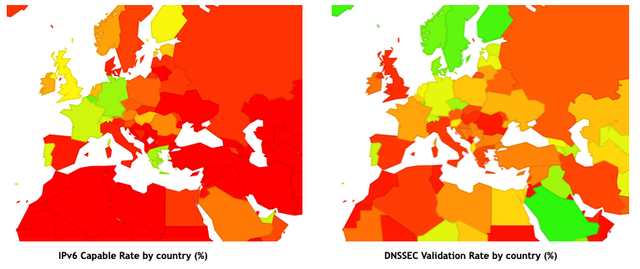
Why is the adoption of these standards so different?
Technically deployment is pretty easy and straightforward. The reasons to deploy are mostly based on economic decisions, markets and planning. Unfortunately, as the market works in much shorter time-frames, the Internet industry doesn’t seem to look forward and has no long-term planning and transition. Wout de Natris pointed us to this document, which outlines 25 pressure points in societies such as changes to education, more attention in the media, consumer advocacy, involvement of politicians or even new laws.
Geoff Huston pointed out that the Internet architecture keeps on changing and technology changes in response to that. Those who don’t adopt new technologies have good reasons for not doing it: Maybe IPv6 doesn’t answer today’s problems, DNSSEC is only implemented in the middle, not at the edge, RPKI is only half the solution and is of little use against malicious actors. So why invest into something that might not solve problem? Not everyone in the room agreed with this analysis.
João Damas explained that there is no incentive to be the first. To top it off, sometimes the expenses and the benefits are not aligned: I need to make an effort and spend money so that you can benefit. Why would I want to do that? RPKI in specific is a safety not a security mechanism. It mostly helps to prevent mistakes we make ourselves. And is it more likely to avoid mistakes by adding more complexity? Caroline Geers from Cloudflare pointed to a campaign they started recently promoting RPKI adoption.
Arda Gerkens, member of the Dutch parliament, lent us the political perspective - that few politicians have technical knowledge on Internet standards. That means this industry has a marketing problem and needs a marketing makeover translating the technical issues for politicians as well as for the average citizen. Arda suggested that some legislative initiatives have been ineffective as they did not include any consequences/fines for non-compliance.
Some other worthy remarks: Caroline Greer rightfully pointed out that when a large provider does not adopt a certain standard, it has a disproportionally large impact on the whole ecosystem. And vice versa! Martin Vliem agreed adding that in many cases to be successful, the protocols need a certain critical mass and that both parties need to have implemented them to get effective protection. There were suggestions for governments to set an example to the rest and to the markets by implementing these standards.
We also discussed the often heard excuse for lack of IPv6 adoption - content providers. While in the telco market there are several major players, and it only takes a few big players adopting to notice a significant boost on a per-country basis, content providers are for more numerous, which makes "taking the lead" far less noticeable. In addition, content providers are protocol-agnostic - they will just go with what is available. Waiting for them to lead the way is counter productive.
As a conclusion of this session we saw that the economics and market dynamics for the different Internet protocols are different. There is no one single fix that will propel adoption. A mechanism that might be effective for the deployment of one standard might do nothing for another. This is why we should make sure to come up with tailored, well-thought out responses.
12 June 2020, 14:30 CEST
Day 2: Smart Solutions for Remote Areas
This session presented several examples of infrastructure developed with the participation of rural communities:
- We got to see an interesting video showing the beautiful mountains of Georgia, where equipment was brought up on horsebacks
- We saw a village in Germany, where all 900 people agreed to improve their connectivity - and in the process, learned a lot about using the Internet
- We found out about the building of a village network in Greece
The presenters pointed out the balance that had to be found between technical requirements and social adoption. There's no point in providing connectivity if people don't know how to use it. That's why education and community building has to be part of the project from the start, next to finding appropriate technical solutions.
Furthermore, there should be a good understanding of local social dynamics and the specific needs of the communities involved. For example, in Georgia, old people who live in remote villages wanted to spend more time with their grandchildren, so the availability of the Internet in their village became an attractive reason for grandchildren to visit!
- Vesna
12 June 2020, 10:00 CEST
Day 2: High-level Topics in Europe (and Beyond)
The second day of EuroDIG began with two keynote addresses that reminded participants about some of the important technical topics affecting European citizens - and indeed, many others around the globe - today.
Noel Curran of the European Broadcasting Union applauded the broadcasting industry for coming together during the COVID-19 crisis to keep Europeans informed, educated and entertained during an unprecedented time in history. He also made the case for a need to protect European values in media and shared his belief that transparency around news selection and provision - being so critical - requires governance. He also stressed the importance of public/private cooperation and highlighted the vital role that standards play in the broadcasting and technology sectors.
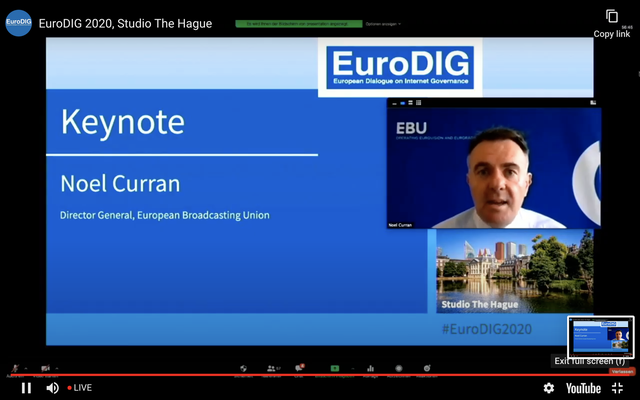
Keynote address during the opening of day 2
Alessandra Todde of the Italian Ministry of Economic Development gave an overview of the different priorities and initiatives being undertaken by the Italian government, recognising the crucial role that digital technology plays in the everyday lives of citizens - again, something that the current crisis has shone a light on like never before. She touched on a broad range of topics, from 5G to autonomous vehicles to providing broadband access for all - a key component of enabling the “gigabit society”.
- Suzanne
11 June 2020, 17:00 CEST
Day 1: To Hack or Not to Hack?
So your content is nicely encrypted. How would then others get to it? One way is to try to intercept it at the end point by... hacking. During ISOC's Open Hour session Olaf Kolkman and Richard Hill took us through the recently published Government Hacking paper.
They define government hacking as "government entities (e.g. national security or law enforcement agencies or private actors on their behalf) exploiting vulnerabilities in systems, software, or hardware to gain access to information that is otherwise encrypted, or inaccessible."
To be sure, security research is not bad per se. On the contrary, it finds vulnerabilities in a system to prove that it can be hacked, but also, so that it can be fixed. However, we go into murky waters once tools are made specifically for exploiting these vulnerabilities. These tools can be used as mini (or not so mini) cyber weapons.
When vulnerabilities are not disclosed to the companies that produced the software, the so-called 0-day vulnerabilities (remember Wannacry?), everyone is exposed, probably beyond the initial target of the hack. The paper opines that governments should always disclose vulnerabilities.
And what about the known vulnerabilities? For these, there is a sort of a level-playing field and the paper recommends governments to take advantage of them only in serious cases and as last resort. Such measures should be proportionate, pursuant to a judicial warrant, and only used so long as there is no foreseeable risk to the security of others. Finally, the paper suggests that each government hacking must follow a set of pre-approved criteria, that are established and assessed in advance.
The discussion took us beyond the scope of the paper. Governments or national security agencies are unlikely to volunteer to hold themselves to a higher standard than the rest, as this would put them at a military disadvantage. Therefore, a global agreement needs to be reached. We do have similar global agreements - for nuclear, chemical and bio weapons. But when were those agreements reached? You guessed it - only after experiencing the pain and devastation they brought on a global scale.
Global politics aside, what can we do at the grassroots level to raise awareness? What can we do to eliminate the "I've got nothing to hide, so why should I care" mindset? In the words of every YouTuber ever - let me know in the comments below :)
- Gergana
11 June 2020, 16:00 CEST
Day 1: Can Public Policy and Technical Standards Ever Get Along?
An interesting afternoon session tackled the question of whether - and how - public policy considerations should be included in developing Internet standards, and included viewpoints from government, civil society and the technical community.
A large part of the discussion centred on the balance of roles between government and the technical bodies setting Internet standards, and how they could give their input and be responsible to one another’s processes. Several examples were given of policies enacted without technical input that resulted in unintended consequences for the Internet and its users, such as BGP hijacking, highlighting the need for technically informed policies as well as the ongoing tension between governments’ increasing desire for “digital sovereignty” and the ability to participate in the global Internet.
Participants shared their different views about whether lawmaking or standards setting tends to be more transparent, with some making the point that, although standard development organisations can be open in theory, they are sometimes not very welcoming to contributions that originate outside of the technical community, raising the question of whether some kind of governmental/technical liaisons would be a useful concept to bridge the two spheres.
“How” and “when” were two of the key questions debated. Interestingly, while there was a majority feeling that technical standards should take into account public policy issues before being developed, participants were divided about whether standards should be reviewed with public policy issues in mind after the fact (but before their release). Some believed that a new body dedicated to providing public policy input on standards setting is needed, while others did not.
Another interesting point of the discussion focused on the issue not just of standards development, but their implementation and adoption, as many participants with experience in standards setting agreed that the devil is in the implementation. One question was when to let the market decide what’s best, versus creating very narrow, specific standards. Another point raised the potential of governments to encourage standards adoption and drive demand through their own procurement by adopting equipment that incorporates certain standards.
Finally, the question of what role civil society plays in standards development was raised, with one participant making an interesting point that the Internet should not be a “black box” to its users, as well as how to give equal voice to smaller players to ensure that the entire standards setting process is not vulnerable to capture by more powerful entities.
The complication in all of this, of course, lies in part in how different the lawmaking and standards development processes are, coupled with the fact that there’s no single government or civil society response to different issues in public policy. There were no easy answers - but that's why we're here at EuroDIG, having an open dialogue in the first place.
- Suzanne
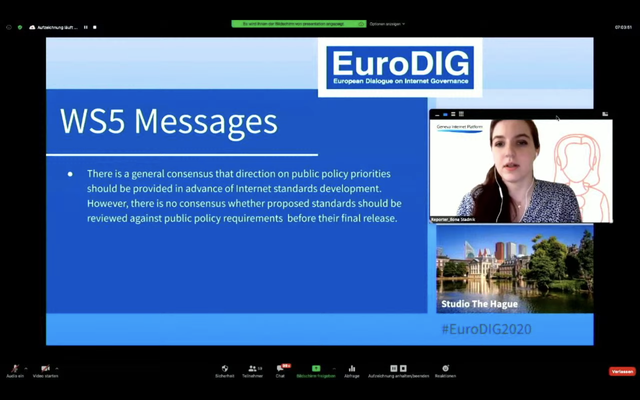
Some of the key messages from the session on public policy and Internet standards
11 June 2020, 11:00 CEST
Day 1: DoH, Changing the DNS Has Impact on Policy
What impact does DNS encryption have on the Internet ecosystem and the policy environment that surrounds it? A small panel featuring RIPE NCC’s executive member Ondrej Filip, speaking for CZ.nic, Vittorio Bertola of Open Xchange and Nicolai Leymann for Deutsche Telekom tried to answer this question.
Although the discussion was focused on high-level impact and policy, it was hard to do so without looking at the underlying technology. Using DNS-over-HTTP (DoH) the browser can bypass the configured resolvers and use a different service. Ondrej showed how different technologies bypass certain elements or actors in the traditional DNS service chain and how it moves responsibilities from the traditional access provider ISP to dedicated service providers. The biggest drawback is that this leads to more consolidation of these functions in the hands of a few very large players.
This might also bypass local filters or customisations that the ISP might apply, including filters mandated by law or voluntary options such as filtering malware or providing parental controls. Next, many DNS answers are customised to the users location and service provider, to distribute load and redirect the user to a nearby server for optimal performance - features that might not work all this well when DNS answers are provided by a service outside the users network.
With regards to privacy and the applicability of GDPR, if you cannot trust your ISP your problem is bigger than just the DNS, and people should probably resort to using VPN services to ensure all traffic is encrypted, not only DNS. One panelist highlighted that GDPR applies even without using encryption and added that pointing your OS to another DNS service provider, would require them to inform users of their rights and obtain consent for processing their data.
A final question was raised regarding the responsibilities of troubleshooting when things go wrong. Users will most often call their ISP when things don’t work as expected, especially in cases where the user might not be aware that they are using a different service. This makes things extremely complicated to troubleshoot.
An audience member suggested to establish a central European resolver and his proposal was met with some reservations. One of the arguments against his suggestion was that it would still incorporate some of the problems that go with centralisation.
- Marco
11 June 2020, 11:00 CEST
Day 1: Never let a crisis go to waste!
The global COVID-19 pandemic locked us all home, sent most, although not all of us online and changed how citizens, businesses and authorities work. The first plenary at EuroDIG took stock of the current state of affairs as well as the risks and opportunities the crisis presents.
What worked?
Among the most immediate effects of the crisis was an increase in traffic. ETNO shared that its members saw data traffic increase of up to 40% for mobile and 70% for fixed connections. Operators scurried to increase network capacity and increase the coverage of their networks, with their top priority - continuity of service. At the same time, governments and businesses rapidly moved their services online, with varying success and speed. New applications popped up helping us adapt to the new reality. Tracking apps were developed to help contain the virus and collect and process data for an effective response. Schools and universities quickly adapted to online classes. We saw an unprecedented amount of action by online platforms to protect users from fraudulent or false content.
What didn't go so well?
Perhaps unsurprisingly, there was an increase of criminal activity online taking advantage of everyone's urge to get medical and other supples and of the inexperience of the many new and existing online users. This exposed our global society's growing dependency on online media and vulnerability to misinformation. By extension, it also increased the distrust and scepticism of some towards the online world, amplified by the privacy concerns surrounding the tracking apps mentioned above.
Probably the biggest unanswered obstacle of all is the persistent digital divide. Many people around the globe still cannot get online. Factors such as living in a poor country, living in a rural area or being a minority or a woman reduce even further their access to a reliable connection. The increased digitisation of business and education makes this painful issue even more obvious and of urgent need to be addressed.
What lessons should we draw?
The crisis is a defining moment which allowed us to draw hard lessons and we shouldn't let it go to waste. Collaborations between businesses, researchers and authorities in supporting local communities, in the delivery of services or in improving citizen's digital skills goes to show that working together can take us far. Cue the multistakeholder model. The fact that we should continue to increase digital skills and upscale ICT infrastructure seems a no brainer. But to facilitate that it is up to business to ramp up investment, government to provide legal certainty and predictability, research to further innovation and the citizens to scrutinise and contribute to this process. Let's not let this crisis go to waste!
- Gergana
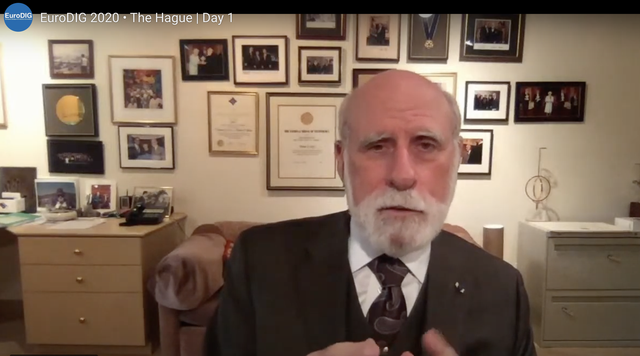
11 June 2020, 09:30 CEST
Day 0: At the Crossroads
We find ourselves online, launching into EuroDIG 2020, the virtual edition. As discussions ramp up on Day 0, we’re reminded that this year’s event was originally planned to take place in Trieste, the Italian city that sits beside the Slovenian border, its location an inspiration for this session: East-West relationships in the Internet age.
The discussion is a useful reminder that EuroDIG is not just an EU discussion, but attempts to draw together diverse experiences and voices from a far larger geographical area. Yet old political divisions and rivalries, while they may have evolved and modulated, have not gone away, and can still have profound effects on how the Internet is governed.
Bruce McConnell, Executive Vice President of the EastWest Institute (a well-known and long-established NGO in the area of international diplomacy) provided some important background. While the Institute’s name initially referred to sides of the Iron Curtain, the breakdown of that divide (or, as he pointed out, what some see as the expansion of “Europe”) has simply transferred to new distinctions, with the divide between China and “the West” now an important driving element in many governance discussions.
At the same time, the discussion also highlighted the equally (if not more) important north-south divide, and the gaps in access and online experience that are so clearly aligned with that.
The session was a useful opening to place the Internet governance discussions at EuroDIG 2020 in the context of the far larger game of global politics. With announcements from the United Nations Secretary-General on the future development of global Internet governance institutions it also came very timely!
- Chris
11 June 2020, 09:30 CEST
Day 0: Where Is Vint and Other Big Questions
I was invited to participate as a panellist on the PRE 7 session, organised by the IGF Dynamic Coalitions for IoT and Core Internet Values (CIV). The session included some high-level speakers with decades of experience in Internet technology and governance, including ICANN’s CTO David Conrad, ISOC’s Olaf Kolkman and the gentleman often seen as ultimately responsible for it all, the inventor of TCP/IP, Vint Cerf.
Looking back at recent events, the discussion focussed on the fundamental question of whether the Internet is “fit for purpose”. Proponents of New IP claim that TCP/IP is too constrained to serve current needs, let alone able to allow new technologies to emerge.
Sadly, the actual proponents of New IP were not able to join, but the organisers found some balance by inviting Anthony (Tony) Rutkowski, a well-known critic of TCP/IP-based technology, and John Grant, who chairs an ETSI standardisation group working on IP alternatives.
We were quick to agree that the Internet mostly delivered and did a wonderful job in supporting our lives and economies during the ongoing pandemic. However, Paul Blaker (UK Government) made an important point that a large part of the population is still not online, and indeed, even in our developed societies, we should not take for granted that everybody has the means or skills to participate in an online society or activities such as home schooling.
Similarly, we should also not take TCP/IP for granted. As I pointed out in one of my interventions, it is absolutely clear that “one size fits nobody”. This is valid for the IP protocol as much as it is for t-shirts, where it has become painfully obvious that IPv4’s 32-bit address space is too small to provide connectivity to us all. At the same time, we should avoid looking back in anger. For sure, in hindsight we may have done things differently. The important point, however, is to embrace and cherish how far we have come. Nobody predicted this when TCP/IP first emerged, just like nobody predicted that in 2020 we would almost totally shut down our global lives and move a significant part of our businesses and daily lives to a virtual world.
If there is one thing we can take away from this pandemic, it is that once again the flexible and modular set of technologies and protocols that form the Internet was quick to adapt and accommodate our current needs: providing relatively cheap and ubiquitous connectivity to an incredibly large number of people all over the globe, who enjoy the freedom to use that connectivity for what they themselves believe to be important, inventing and modelling their online world. We can bicker forever about which protocol to use and whether the current set of protocols is fit for purpose, but the fact that we can continue to discuss and evolve what we have in an open and inclusive matter is what I see as the real core Internet value.
Looking back is easy; predicting the future, not so much. I was glad that, after first being lost on his own Internet and connecting to the wrong session, Vint Cerf in general agreed with the points we made, that indeed the Internet is fit for purpose and that one of its important features is that you can adapt it to better support current needs.
He also once again supported our call to adopt IPv6. Looking back, if there is one thing that I learned during my 20-year career on the Internet is that talking about replacing a protocol is easy, but actually doing it and putting it in place is something completely different.
True to the engineering hearts and minds that put it all together, we concluded that the Internet might not be perfect, but for sure it is good enough.
- Marco
10 June 2020, 13:00 CEST
Day 0: HLIG
The unofficial, or "pre" day of EuroDIG started with the HLIG session, which stands for High Level Group on Internet Governance. It was created by the European Commission in 2003 to provide a platform for sharing information and good practices as well as to coordinate and discuss common positions related to Internet governance. It is useful to get early-stage input about policy development to facilitate the EU Member States speaking with "one voice".
So, what was discussed this time?
The session started with reaffirmation of the Commission's firm support for the multistakeholder model. EuroDIG organisers explained the program structure of the virtual EuroDIG, which remained more or less the same as the previous in-person meetings (and mentioned a brief scare yesterday when the data centre they are using went down!).
We at the RIPE NCC shared our observations of how COVID-19 affected the performance of the Internet: even though there were some decreases in download speeds in some places, we don't have reports of significant DNS effects, nor was critical infrastructure's capacity decreased. The most significant challenge has been in last-mile networks and the persistent performance difference between urban and rural networks. You can read a collection of articles here.
Several presentations covered COVID-related domain name abuse. Law enforcement and ccTLDs have analysed thousands of newly registered domain names, with COVID-related registrations peaking at the end of March. While stats varied depending on the organisation in question, the main message was that the abusive domain names appeared to be relatively few - only around 750 were suspended. However, the process, described as "searching for a needle in a haystack", highlighted the importance of collaborating with authorities, the need for accurate and available domain name registration data and the need for more effort in establishing a single point of contact.
It was recognised that, both in terms of Internet performance in general and in domain name abuse, the media seems to have blown the problems way out of proportion.
However, a point was raised that the crisis has left many children struggling to get access to education - be it due to unstable connections or, more often, due to lack of adequate equipment in the household (think of just one or two computers for a household of four). This brings up the question of whether access to a stable connection and adequate equipment is a human right.
The session also provided a summary of the recently published consultation on the IGF Plus model as part of the UN Secretary-General's High-level Panel on Digital Cooperation. Among the recommendations is turning the IGF into a more results-oriented forum, able to make public policy recommendations. Another one is to improve participation of the private sector, especially industries and tech companies as well as minorities and underrepresented communities.
We also heard about the work of We, the Internet, which aims to inform citizens of Internet governance issues and make their voices and opinions heard.
Last but not least, we got an update on the WHOIS Expedited Policy Development Process, which aims to produce a standardised system for legitimate access for WHOIS data. For a dive deep into details of phase two, you can follow this link to draft documents, work plans and more. Currently, the so-called SSAD model is a hybrid one, meaning that some processing activities are performed centrally, while others, most notably the disclosure decision, is performed by contracted parties. Issues such as registration data accuracy and the differentiation between legal and natural persons remain unresolved. Other points that need to be discussed further are the personal data disclosure responsibilities between ICANN and the contracted parties, as well as issues around international data transfers and the effective evolution of the SSAD model.
- Gergana

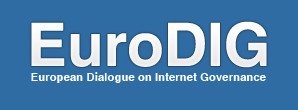


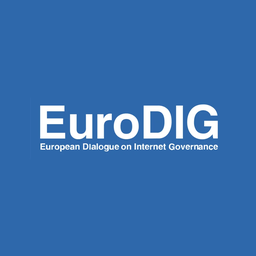
Comments 0
The comments section is closed for articles published more than a year ago. If you'd like to inform us of any issues, please contact us.